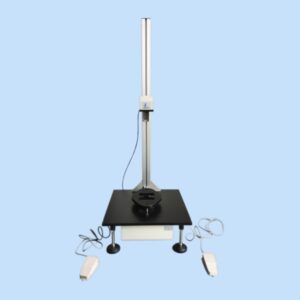PCT-01 Pouch Compression Tester
- Standard: ISO 2234, ISO 12048, ISO 2874, ISO 2872, ASTM D642,ASTM D4169, TAPPI T804, JIS Z0212,GB/T 4857.3, GB/T 4857.4, QB/T 1047, GB/T 10004, YBB 00112005
- Manufacturer: Cell Instruments
- Applications: Packaging materials, medical device materials, pharmaceutical testing, adhesives, textiles, paper and cardboard containers, and more.
- Customization: Available for special testing requirements and automation transformations
The Pouch Compression Tester is a vital instrument for assessing the compression strength and durability of various pouch-style packaging materials, commonly used in industries like food, pharmaceuticals, and consumer goods. This tool helps manufacturers ensure that their packaging can withstand the physical stresses encountered during shipping, handling, and storage. By simulating real-world compression forces, the Pouch Compression Tester provides valuable data for optimizing packaging design and maintaining product integrity.
I. Features of the Pouch Compression Tester
The Pouch Compression Tester is equipped with advanced features designed to ensure precision and ease of use:
Touchscreen Interface for Easy Operation:
- The tester is equipped with a user-friendly HMI touchscreen, which allows operators to quickly set parameters and initiate tests.
Industrial-Grade PLC Control:
- The tester’s industrial-grade PLC system ensures that the tests are accurate and repeatable, providing reliable results every time.
Dual Test Modes:
- It features two key modes: maximum compression force testing, which evaluates the highest force the pouch can endure before failure, and constant pressure resistance, which measures how well a pouch holds up under a steady load.
Automatic Data Collection:
- The tester automatically collects and stores test data, making it easier to analyze the performance of different materials over time.
Customization Options:
- The tester’s platen size and measurement range can be customized to meet the specific requirements of the packaging material, ensuring versatile application.
Compliance with International Standards:
- The Pouch Compression Tester adheres to major international standards such as ISO 2234, ASTM D642, GB/T 4857.3, and more, making it suitable for global manufacturing operations.
II. Testing Process: How the Pouch Compression Tester Works
The Pouch Compression Tester operates through a systematic process that mimics real-world conditions, ensuring accurate and meaningful results. Here’s a step-by-step breakdown of how the testing works:
Sample Placement:
- The packaging material (such as a plastic pouch, infusion bag, or other flexible container) is placed between the upper and lower compression plates of the tester.
Initiating Compression:
- The upper plate is moved downward, applying a controlled force on the pouch. This simulates the pressure the packaging might experience during stacking, storage, or transportation.
Real-Time Force Measurement:
- The lower pressure plate continuously measures the force applied to the sample. This data is recorded in real time and can be analyzed to understand the material’s breaking point, or its resistance to consistent pressure.
Data Interpretation:
- The results from the test help determine whether the pouch can handle expected conditions in its lifecycle. Factors like the material’s thickness, elasticity, and overall design contribute to its ability to withstand compression forces.
III. The Significance of the Compression Test
Compression testing is essential for determining the integrity and durability of pouch packaging. In industries like pharmaceuticals, where products such as infusion bags or blood bags are sensitive to pressure changes, a robust packaging design is crucial. Testing allows manufacturers to:
- Optimize Packaging Design:
- By understanding how the packaging behaves under stress, manufacturers can adjust the material composition, thickness, or design to improve performance.
- Ensure Product Safety:
- Proper testing ensures that the packaging won’t fail during transit, safeguarding the product and reducing the risk of contamination or damage.
- Maintain Regulatory Compliance:
- Many industries require adherence to strict standards for packaging performance, such as ISO 2234 or ASTM D642. The Pouch Compression Tester helps manufacturers meet these standards, avoiding costly product recalls or regulatory penalties.
IV. Standards Compliance
The Pouch Compression Tester complies with a range of international standards, ensuring its reliability and versatility for manufacturers:
- ISO 2234: Specifies stacking tests for complete, filled transport packages.
- ISO 12048: Defines methods for determining compression strength.
- ASTM D642: Covers testing for compressive resistance of shipping containers.
- ASTM D4169: Evaluates shipping containers and systems under simulated distribution conditions.
- GB/T 4857.3 and GB/T 4857.4: Chinese standards that focus on compression testing for packaging.
V. Technical Specifications
| Measuring range | 2000N (other optional) |
| Measurement accuracy | 0.5% |
| Time range | 0~10000S |
| Platen size | 250mm*300mm (can be customized) |
| Power supply | 220V, 50HZ |
| Dimension | 460mm*410mm*590mm |
VI. FAQs
What types of packaging can the Pouch Compression Tester evaluate?
- The tester is designed to evaluate flexible packaging materials like plastic pouches, infusion bags, and other similar containers, ensuring their durability under compression.
How does the Pouch Compression Tester measure compression force?
- The tester uses a real-time force measurement system in the lower platen, which records the pressure applied during the test and helps analyze the material’s resistance to compression.
Can the Pouch Compression Tester be customized?
- Yes, the tester allows for customization of platen sizes, force ranges, and even data collection methods to meet specific testing requirements.
What standards does the Pouch Compression Tester comply with?
- The tester adheres to a variety of international standards including ISO 2234, ASTM D642, GB/T 4857.3, and others, making it suitable for use across industries and regions.
How does the Pouch Compression Tester help in product design?
- By providing detailed data on how the packaging material responds to compression forces, manufacturers can optimize the design to enhance durability, reduce material costs, and meet regulatory standards.



